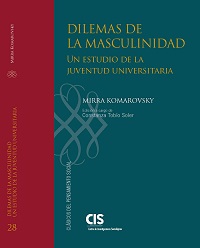
Dilemmas of masculinity
Mirra Komarovosky. Constanza Tobío (Ed.), Ovidi Carbonell (translator)
429
Madrid, 11/27/24
ISBN: 9788474769401
Descripción
Mirra Komarovsky belongs to a second wave of female sociologists, when the scientific study of society had already become established at the university level. Unlike her predecessors, she was able to acquire an academic education, but when she wanted to make sociology her professional activity, she faced multiple obstacles because, as her mentor William Ogburn had warned her, she was a woman, Jewish, and an immigrant. Despite this, she was a researcher at the New School for Social Research, where she collaborated with Max Horkheimer and Paul Lazarsfeld and wrote her doctoral thesis on the effects of the Great Depression on male authority within the family. She later joined Barnard College, the women's college affiliated with Columbia University, where she became a professor. She returned to it in 1979, after retiring, as professor emeritus to create a women's studies program, the second largest among all North American universities.
The central theme of her sociological work is gender roles, which she studied separately for the middle class and the working class. Within the hegemonic context of structural functionalism in the mid-20th century, Komarovsky's perspective was profoundly heterodox. Contrary to the dominant idea that the values and lifestyles of the middle classes represented the entirety of American society, she showed the profound divergences and limited opportunities available to those who belonged to the lower classes, even if they were white, Protestant, and Native American.
The male and female roles addressed in this book were studied by the author in different social contexts. Young male students at a progressive university in the 1970s faced multiple dilemmas. The old roles in which they had been educated did not fit the new behaviors of their female classmates, who no longer had as a reference the family theorized by Talcott Parsons, in which they played the role of mothers and homemakers.
